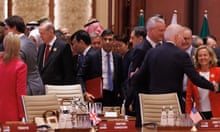The G20 bloc of wealthy economies meeting in India failed to reach a consensus on phasing down fossil fuels on Saturday after objections by some producer nations.
Scientists and campaigners are exasperated by international bodies’ foot-dragging on action to curb global heating even as extreme weather across the northern hemisphere underlined the climate crisis facing the world.
The G20 member countries together account for more than three-quarters of global emissions and gross domestic product, so a cumulative effort by the group to decarbonise is crucial in the global fight against climate breakdown.
However, disagreements including the intended tripling of renewable energy capacities by 2030 resulted in officials issuing an outcome statement and a chair summary instead of a joint communique at the end of their four-day meeting in Panaji, the capital of the Indian coastal state of Goa.
A joint communique is issued when there is complete agreement between member nations on all issues.
“We had a complete agreement on 22 out of 29 paragraphs, and seven paragraphs constitute the chair summary,” said the Indian power minister, RK Singh.
Sections urging developed countries to deliver on the goal of jointly mobilising $100bn (£78bn)a year for climate action in developing economies from 2020-25, and a description of the war in Ukraine, also eluded consensus.
Fossil fuel use became a lightning rod in daylong discussions, but officials failed to reach consensus over curbing “unabated” use and argued over the language to describe the pathway to cut emissions, two sources familiar with the matter said.
A draft late on Friday reviewed by Reuters read: “The importance of making efforts towards phase down of unabated fossil fuels, in line with different national circumstances, was emphasised.”
after newsletter promotion
However, the chair statement released on Saturday evening included concerns from some member nations that were missing in the Friday draft, saying “others had different views on the matter that abatement and removal technologies will address such concerns”.
Singh, in a press briefing after the conference, said some countries wanted to use carbon capture instead of a phase-down of fossil fuels. He did not name the countries.
Saudi Arabia, Russia, China, South Africa and Indonesia are all known to oppose the goal of tripling renewable energy capacity this decade.










